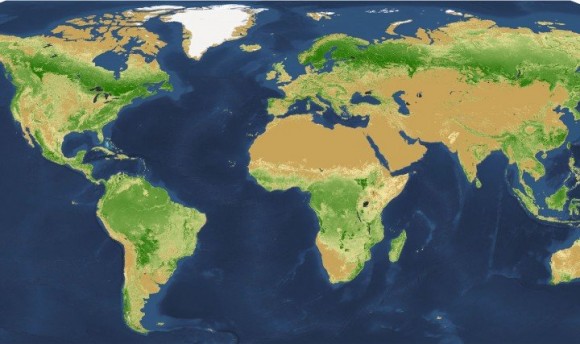A study by an international team of researchers says that there are 3.04 trillion trees on Earth, roughly 422 trees per person. That number is about 7 times greater than previous estimates.
But according to the study, published in the journal Nature on September 2, 2015, the number of trees has dropped by 46% almost half since the onset of agriculture about 12,000 years ago.

Thomas Crowther, a Yale University Climate & Energy Institute postdoctoral fellow is lead author of the study. Crowther said:
[Trees] store huge amounts of carbon, are essential for the cycling of nutrients, for water and air quality, and for countless human services. Yet you ask people to estimate, within an order of magnitude, how many trees there are and they don’t know where to begin. I don’t know what I would have guessed, but I was certainly surprised to find that we were talking about trillions.

The team used a combination of satellite imagery, forest inventories, and supercomputer technologies to map tree populations worldwide at the square-kilometer level.
The highest densities of trees were found in the boreal forests in the sub-arctic regions of Russia, Scandinavia, and North America. But the largest forest areas, by far, are in the tropics, which are home to about 43% of the world’s trees. (Only 24% are in the dense boreal regions, while another 22% exist in temperate zones.)
Around 15 billion trees are cut down each year, the researchers estimate.
In fact, human activity is the largest driver of tree numbers worldwide, said Crowther. He said:
The scale of human impact is astonishing.Obviously we expected humans would have a prominent role, but I didn’t expect that it would come out as the as the strongest control on tree density.

The researchers found that climate can help predict tree density in most biomes. In wetter areas, for instance, more trees are able to grow. However, the positive effects of moisture were reversed in some regions because humans typically prefer the moist, productive areas for agriculture.
While the negative impact of human activity on natural ecosystems is clearly visible in small areas, the study provides a new measure of the scale of anthropogenic effects, highlighting how historical land use decisions have shaped natural ecosystems on a global scale. In short, tree densities usually plummet as the human population increases. Deforestation, land-use change, and forest management are responsible for a gross loss of over 15 billion trees each year. Crowther said:
We’ve nearly halved the number of trees on the planet, and we’ve seen the impacts on climate and human health as a result. This study highlights how much more effort is needed if we are to restore healthy forests worldwide.
The study was inspired by a request by Plant for the Planet, a global youth initiative that leads the United Nations Environment Programme’s “Billion Tree Campaign.” Two years ago the group approached Crowther asking for baseline estimates of tree numbers at regional and global scales so they could better evaluate the contribution of their efforts and set targets for future tree-planting initiatives.
At the time, the only global estimate was just over 400 billion trees worldwide, or about 61 trees for every person on Earth. That prediction was generated using satellite imagery and estimates of forest area, but did not incorporate any information from the ground.
Enjoying EarthSky? Sign up for our free daily newsletter today!
Bottom line: A study published Nature on September 2, 2015 says that there are 3.04 trillion trees on Earth, about 7 times greater than previous estimates. According to the study, the number of trees has dropped by 46% almost half since the onset of agriculture about 12,000 years ago.











